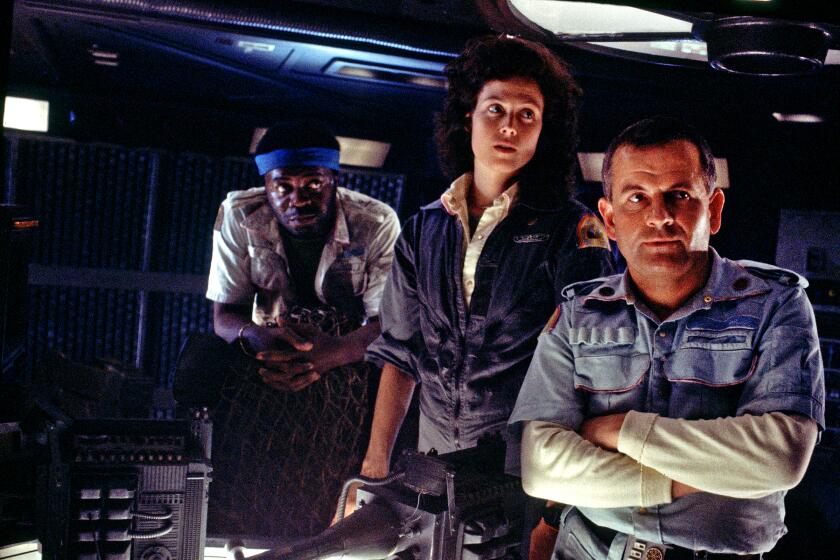Jacques Audiard finds romance pulsing in steely ‘Dheepan’
reporting from CANNES, France — It’s been three years since I talked to French director Jacques Audiard at the Festival de Cannes for his “Rust and Bone,” six since I interviewed him about his exceptional, Grand Prize-winning “Un Prophète.” When I complimented him on how much his English had improved over time, his reaction was characteristically brisk.
“Yet every year, your French does not improve,” he said in crisp English, smiling but sharp and to the point. “Why do you keep coming back to France?”
Point taken.
Congenitally unable to say or do things in an expected, conventional way, Audiard is back in the Cannes competition with “Dheepan,” a feature he accurately described, now speaking through a translator, as “a French film where people speak Tamil.”
An intense, emotionally involving piece about a trio of Tamil exiles trying to reconstruct their lives in France, “Dheepan” (to be distributed in the U.S. by IFC) underlines Audiard’s gift for compelling moviemaking, for creating situations that make us fear for his characters as much as we fear for ourselves. And, as it has been in the past, his focus is on those who live on society’s margins.
“I have more empathy and compassion for those people,” he agrees, “because the longest journey you can take to change your life is from those margins. As much as I love French actors, if this story had centered on them, I would not have wanted to do it.”
The protagonist in “Un Prophète” also makes such a journey, and Audiard confesses that “at one point these films seemed so much connected that I almost didn’t do this one. Then I discovered the dark heart beating within this Trojan horse. I discovered that love was at the center, love was the cause of it.”
“Dheepan” is named after its protagonist, played by Jesuthasan Antonythasan. He’s introduced as a soldier, a Tamil Tiger fighting in Sri Lanka’s civil war, who decides he has had enough.
Concluding that he would have a better chance for asylum in France if he had a family, Dheepan rounds up two strangers, a woman named Yalini (Kalieaswari Srinivasan) and a 9-year-old named Illayaal (Claudine Vinasithamby) and passes them off as his wife and daughter.
The trio makes it to France, where Dheepan manages to find a job as a building custodian in a housing project outside of Paris. He throws himself into his work, but problems involving his past, his present and his future emerge in potentially devastating ways.
Though you wouldn’t guess it from the film’s taut structure, “Dheepan’s” story came into being, in the director’s words, “piece by piece.” Audiard’s co-screenwriters Noé Debré and regular collaborator Thomas Bidegain were first working on what was to be a remake of Sam Peckinpah’s “Straw Dogs.”
“That script was a vigilante story, and though there was a great film in it, it was not the film I wanted to do,” Audiard says. “That’s when the idea emerged that the film was a love story, that this man would do anything for his family out of love.”
Making the characters refugees from Sri Lanka was also something that emerged gradually. “These people are running away from a tragedy,” the director explains, “and I didn’t want it to have anything to do with post-colonial France. Sri Lanka seemed like the end of the earth for me; before embarking on this project I couldn’t have located it on a map.”
Making his lead actors Tamil speakers, however, made the casting process difficult. “In France, the Tamil diaspora is a pretty small one, but with the help of God I found Jesuthasan,” a writer who had not acted before. To find costar Srinivasan, Audiard and his casting people had to go to Chennai, formerly Madras, in India.
Not one to dwell on difficulties, Audiard says working with non-French-speaking actors was not especially hard. “Each actor always speaks a foreign language,” he says. “As a director you have to learn the language of each one.”
With an admitted taste for genre movies and a talent for making relevant melodrama, Audiard says that infusing the plot of “Dheepan” with ideas on subjects like immigration, refugees and family was second nature.
“It’s not a goal, like I wake up with it every morning as something to do,” he says. “It’s probably just part of my mind.”
What did attract Audiard to “Dheepan” was the dramatic arc of its characters, “the history of love constructed in front of our eyes. In the beginning it is a lie, a fiction, but we go from a lie they pretend to something that becomes real.”
So does Audiard consider himself a romantic? The director smiles and hesitates for a minute. “A cynical romantic,” he says finally, but he’s not even sure about that.
Twitter: @kennethturan
For more Classic Hollywood, follow us on Facebook and subscribe to the newsletter
More to Read
Only good movies
Get the Indie Focus newsletter, Mark Olsen's weekly guide to the world of cinema.
You may occasionally receive promotional content from the Los Angeles Times.











